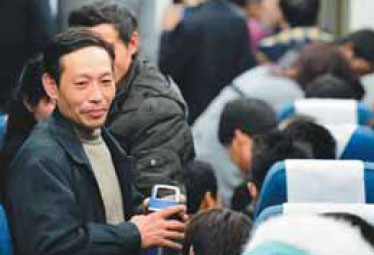A migrant worker's epic trip to be together with his family
|
Luo Hengdi must stand on the train from Nanjing to Chengdu. Li Xiang / Xinhua |
Luo Hengdi arrived home at 3 am on Tuesday after an epic journey that typified the annual of millions of Chinese migrant laborers in seeing loved ones over Spring Festival.
The 2,000-km trip from Nanjing in East China's Jiangsu province to his hometown in southwestern Sichuan province took exactly 36 hours.
In 2003, Luo, now 51, left his life in the countryside to further his livelihood and that of his family back home by working as a carpenter in the city. Since then, he has labored in temporary jobs at construction sites in Wuhu, a small city in the eastern province of Anhui.
Going home was costly and time-consuming, so he did so only once every 12 months, on the eve of the Chinese Lunar New Year. This year, the new year begins on Jan 31.
But his heart was torn between his wife and 10-year-old daughter at home, and his grown-up son who works as a chef in Nanjing.
He was particularly disappointed that his son, Luo Heng, was not going home with him this year: the young man had decided to spend the New Year with his in-laws in Anhui.
Eager to see his son and his 9-month-old granddaughter, Luo took a bus to Nanjing on Saturday, a day before he traveled home, and spent a night with them.
Luo cuddled with the baby girl and posed for photos with her. "My wife and daughter have never met her," he said. "It's a pity I cannot bring her home, so I can only show them her pictures."
After he waved goodbye to his son's family, Luo boarded a train from Nanjing to Chengdu on Sunday afternoon.
The train carried 1,140 passengers when it left Nanjing. Luo was among some 200 passengers who didn't have a seat - as demand for tickets far exceeded the train's capacity. Extra tickets were sold for the same price of 244 yuan ($40), but with no seat. These ticket holders could only stand or crouch in the aisles or near toilets.
After a few stops at major stations, the number of passengers topped 1,800 and most carriages were overloaded. The majority of the passengers were migrant workers from Sichuan, just like Luo.
Theirs was a common fate among Chinese migrating during the 40-day holiday travel rush, which began on Jan 16, a period that will witness an estimated 3.6 billion passenger trips by train, air, ship and bus.
After he got off the train, Luo took the subway to a bus terminal near another train station in the northern suburbs of Chengdu. On all his previous trips, Luo had taken buses from there to his home county of Longchang. This year, however, things were not the same.
"The workers at the terminal said buses to Longchang did not go from here any more," he said. "They said I had to travel to another bus terminal, or wait until tomorrow to try my luck here."
Luo decided he could not wait. He jumped back on the subway and returned to Chengdu East Station, where he bought a ticket for a slow train from Chengdu to Longchang that night.
The five-hour train ride got him to the Longchang county seat at 2:30 am on Tuesday.
It was foggy outside. Several taxi drivers were waiting for business, but none was willing to take Luo and his luggage, which weighed at least 30 kg, to the countryside in the misty weather.
Eventually, he had to offer nearly three times the standard fare to persuade a driver to take him home. The 10-km ride cost him 40 yuan.
It was 3 am when Luo arrived home in Guangcan village of Jin'e township. He didn't have to knock on the door too hard; his wife had been waiting all the while. "It's worth the trouble as long as I can get home," he said. "I hope we'll have a big family gathering next year."



















